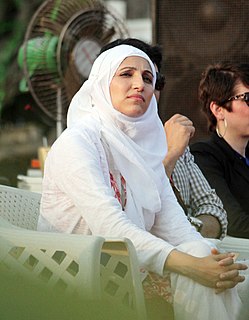
Politics of Bahrain has since 2002 taken place in a framework of a constitutional monarchy where the government is appointed by the King of Bahrain, King Hamad bin Isa Al Khalifa. The head of the government since 1971 has been Prime Minister Prince Khalifa bin Salman Al Khalifa and the Crown Prince is Prince Salman bin Hamad Al Khalifa, who also serves as deputy Commander of the Bahrain Defence Force. The parliament is a bi-cameral legislature, with the Council of Representatives elected by universal suffrage, and the Consultative Council appointed directly by the king.

The National Assembly is bicameral with the lower house, the Chamber of Deputies, having 40 members elected in single-seat constituencies for a four-year term. The upper house, the Shura Council, has 40 members appointed by the King of Bahrain, with the stated aim of giving a voice to minority communities and technocratic experts within the legislative process. Supporters of the system refer to long established democracies the United Kingdom and Canada operating with this bicameralism with an appointed upper chamber and an elected lower chamber. Opponents of this system point out that unlike the bicameral systems in the UK and Canada, the Bahraini system gives the unelected upper house equal or more legislative power than the elected lower house, allowing the King to control all legislation. Opponents also point out that the current system was imposed unilaterally by the King, violating the 1973 Constitution and a 2001 signed agreement with the Bahraini opposition.

Al-Wefaq National Islamic Society, or Al-Wefaq for short, is a Shia Bahraini political party. Although from 2006 to 2011 it was by far the single largest party in the Bahraini legislature, with 18 representatives in the 40-member Bahraini parliament, it was often outvoted by coalition blocs of opposition Sunni parties and independent MPs reflecting gerrymandering of electoral districts. On 27 February 2011, the 18 Al-Wefaq members of parliament submitted letters of resignation to protest regime violence against pro-reform Bahraini protestors.

Women's rights have been a cornerstone of the political reforms initiated by King Hamad, with women gaining the right to vote and stand as candidates in national elections for the first time after the constitution was amended in 2002. The extension of equal political rights has been accompanied by a conscious drive to promote women to positions of authority within government.
Sheikh Mohammed Khalid Ibrahim is a Bahraini Islamist politician and a member of the Al-Menbar Islamic Society in Bahrain. He was an MP in the lower house of the Bahraini parliament, having been elected in the 2002 Bahrain parliamentary elections representing a constituency from the Northern Governorate. Khalid is a known outspoken critic of the Bahraini government over conservative issues such as the selling of alcohol.
Munira Fakhro is a Bahraini academic and was a candidate in Bahrain's 2006 general election for the opposition Waad.

Al Menbar National Islamic Society is the political wing of the Sunni Islamist Al Eslah Society in Bahrain and Bahrain's branch of the Muslim Brotherhood. The president and patron of the Al Eslah Society is Shaikh Isa bin Mohammed Al Khalifa, a member of the Al Khalifa royal family and former labor minister of Bahrain. Prominent members of Al Menbar include Salah Abdulrahman, Salah Al Jowder, and outspoken MP Mohammed Khalid. The party has generally backed government-sponsored legislation on economic issues, but has sought a clampdown on pop concerts, sorcery and soothsayers. Additionally, it has strongly opposed the government's accession to the International Covenant on Civil and Political Rights.

General elections were held in Bahrain in November and December 2006 to elect the forty members of the Council of Representatives. The first round of voting was held on 25 November, with a second round on 2 December 2006.
The Al Asalah Islamic Society is the main Sunni Salafist political party in Bahrain. The party is the political wing of the Islamic Education Society which funds the party. Asalah's leader is Ghanim Al Buaneen, who took over in 2005 from Adel Mouwda, who was sacked because he was perceived to be too close to Shia Islamists, Al Wefaq. Asalah is most popular in the conservative bastions of Muharraq and Riffa. Asala often aligns with Al-Menbar to outvote Al Wefaq.
Lateefa Al Gaood is a Bahraini politician. In 2006, she became the first female candidate to be elected to the Council of Representatives of Bahrain. She won by default after the other two candidates in her constituency withdrew from the race in the middle of October before campaigning began. She was also the first woman in the Persian Gulf region to win in a legislative general election. She represents the sixth constituency of the Southern Governorate. Due to her previous electoral failure she stood for a different constituency in 2006 to increase her chances of getting elected. She is currently the only female member of the Council of Representatives. She graduated from the University of Nottingham in 1996. She also holds diplomas from Helwan University in Egypt as well as the Darden Graduate School of Business Administration in Virginia. She used to work for the Bahraini Ministry of Finance.

Bahrain is divided into four Governorates: the Capital, Northern, Southern and Muharraq. Until September 2014, there were five, when the Central Governorate was abolished.

General elections were held in Bahrain in October 2010 to elect the forty members of the Council of Representatives. The first round of voting was held on 23 October, with a second round on 30 October. Amidst boycotts and arrests, Al Wefaq won 18 of the 40 seats. Four women were elected.

Rawya Ateya was an Egyptian woman who became the first female parliamentarian in the Arab world in 1957.

Women in Bahrain are generally more publicly active than women in other Arab countries. They are highly educated, and are represented in all the major professions, women’s societies, and women’s organizations. They have the right to vote, and around one-quarter of women in Bahrain hold jobs outside of the household.
Valerie Wise is a British socialist politician and political activist. She is among the fourth generation of Labour Party activists in her family.

General elections were held in Bahrain in November 2014 to elect the forty members of the Council of Representatives. The first round of voting took place on 22 November, with a second round on 29 November in the 34 constituencies in which no candidate received a majority.

Salma Sultana Yaqoob is a British political activist and psychotherapist. She was formerly associated with the Respect Party, of which she was leader and vice-chairman, and a Birmingham City Councillor representing that party. She is the head of the Birmingham Stop the War Coalition and a spokesperson for Birmingham Central Mosque. On 11 September 2012, Yaqoob confirmed that she had left Respect.

General elections were held in Bahrain in November and December 2018 to elect the 40 members of the Council of Representatives. The first round of voting was on Saturday, 24 November, with a second round in 31 constituencies on Saturday, 1 December. A municipal poll coincided with the parliamentary vote.
Fawzia Abdulla Yusuf Zainal is a Bahraini media and social activist and politician who has been Speaker of the Council of Representatives since 12 December 2018. Zainal is the first woman to lead Bahrain's parliament, and the second woman to lead a Gulf-Arab parliament after UAE's Amal Al Qubaisi.









